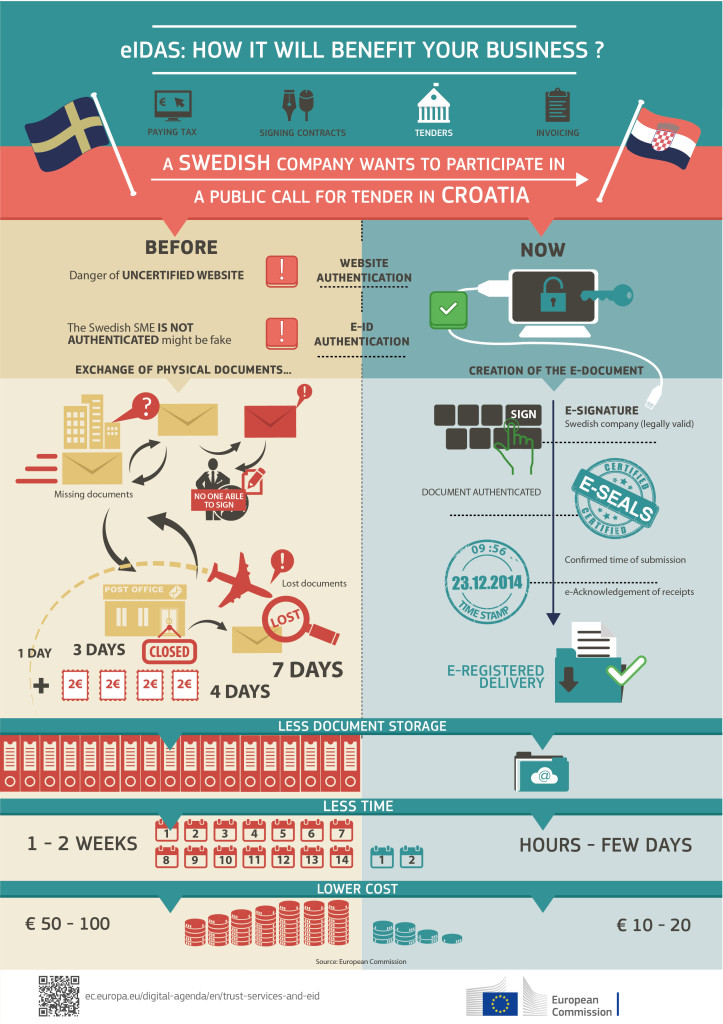The eIDAS regulation (EU) No.910/2014 on electronic identification and trust services for electronic transactions in the internal market was adopted 2014 by the European Parliament and takes effect on 1 July 2016. The purpose of the regulation is to simplify electronic signatures, seals and other authentications EU-wide and to lay the groundwork for cross-national digital authentications. The regulation defines: Electronic Signatures: the digital equivalent of a written signature, legally binding Electronic Seal: for legal persons, guarantees the origin and integrity of a document Time stamping: proves that the document existed at a specific time and date and was not changed since then Electronic registered delivery: similar to the registered mail in the real world Legal admissibility of electronic documents: ensures the authenticity and integrity of digital documents Website authentication: certification of websites to verify their authenticity and source For more information: Full Text of Regulation (EU) No.910/2014 The electronic signature is especially important in this context. The new eIDAS regulation differentiates between the advanced electronic signature and the qualified electronic signature. The advanced electronic signature allows the distinct identification of the signer by using a certificate from a Certificate Authority (CA). The certificate is obtained by the signer and cryptographically bound to the document during the signature process. Under the new regulation this can be realized with mobile devices as well. The qualified electronic signature is the legal equivalent to the written signature and it’s legal validity is recognized by all EU member states. It is based on qualified certificates issued by Certificate Authorities, which are accredited and supervised by authorities. The certificates can be stored on hardware token as smart cards or USB token. Also, Cloud Trust Center may be used to access the certificates. SecCommerce has been offering eSignature and eFiles Solution for over 17 years. We are providing our customers with all components needed to build their own eSignature services. This includes the signature server, the identity server (providing the different two-factor authentication methods) and the portal for safe file exchange and encrypted messages with automatic signature for all files and messages. The new regulations for eSignatures simplify the process of qualified signatures considerably. While they are still interesting for companies and corporate clients, private customers do no longer need smart cards and card reader to perform legally binding electronic signatures. To guarantee secure eSignatures we also offer our strong two-factor authentication for all signature processes. The powerful PKI Server and Challenge Response Authentication ensure unprecedented security. More information about our strong touch two-factor authentication can be found here. Easy electronic signatures with eIDAS
eIDAS offers numerous advantages for our digital life
The new eIDAS regulation and SecCommerce
SecCommerce
Menü
Electronic Signatures
- The Signature Portal
- Signature types
- Signature tools for end users
- FAQ (SecSigner)
- Signatures in web applications
- Substitute scanning and signing (e-records)
- Digital mailroom and digital signature for incoming mail
- Multiple signatures used for workflow
- Verification and creation of mass signatures or individual signatures on server side
- Long term archiving with hash trees
- Remote Qualified Electronic Signature
- Electronic Seal eIDAS
- Identity and Access Management IdM 2FA
Encryption
Private Cloud
High security and easy to use
Client Software
SecSigner
Create electronic signatures
SecCardAdmin
Administration of signature cards
Signatur Workflows
Signature Portal
Complex signature workflows with all signature types
SecArchive
Substitute scanning
SecPKI Server
Central server of several products
SecVerification Server
Verification & decryption
SecSigner Server
encryption & signature creation
Two Factor Authentication
SecRouter
Secures website access
SecAuthenticator
User identification
SecSignID
Two Factor Authentication
SecSignID Server
SecSignID on-premise solution
File storage & sharing
SecSign Portal Server
Secure messaging and file sharing
